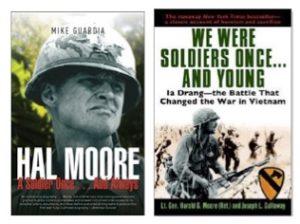Over the last few weeks I read two fascinating books: Hal Moore: A Soldier Once…and Always by Mike Guardia, and We Were Soldiers Once…and Young. We Were Soldiers Once…and Young focused nearly exclusively on the action at LZ X-Ray in the Ia Drang valley and the immediate aftermath of the battle. Hal Moore: A Soldier Once…and Always was a complete biography of Hal Moore’s remarkable life.
In the last lesson, we reviewed Moore’s thinking process. As you recall, he would periodically withdraw from the action to think. He would ask himself:
- What is happening?
- What is not happening?
- How can I influence action?[1]
Why Moore?
Moore was a soldier. I am a civilian. How does this relate to me?
Some skills are transferable. Math works whether you are a soldier or a businessman. So do the basic principles of leadership. The context changes, certainly, but the underlying principles do not.
In the movie, We Were Soldiers, we saw LTC Moore tell his soldiers that he would be the first to set foot on the battle-field and the last to step off. The account in the book, We Were Soldiers Once…and Young, confirmed that he was indeed in the first helicopter that reached the battlefield: “As the chopper skids touched the ground I yelled, ‘Let’s go!’ and jumped out, running for the trees on the western edge of the clearing, firing my rifle.”[2] More importantly, “Hal Moore was the last man to come out of the battle.”[3]
Why Are Actions Important?
We willingly follow leaders when we trust them and there are few better ways to earn trust than to demonstrate that you are willing to do what you ask of others. Actions are often symbolic. They proclaim our values whether we intend them to or not. It is in our actions, not in our words, that we earn the deepest trust.
Actions can be faked—at least in the short term. Over time, however, actions usually mirror the leader’s philosophy. More precisely, actions reflect the leader’s true philosophy. When a leader says one thing but does another, followers believe what he does, not what he says.
Actions build trust. Consistent action solidifies that trust.
Why Are Words Important?
When words are consistent with actions, leaders build enormous levels of trust.
Below I have listed a few of Moore’s statements. They will give you insight into the kind of leader that he was. What do these statements say about his leadership? Ask yourself if this is the kind of leader you would want to follow:
- “There must be total loyalty, up and down the chain of command.”
- “Never take a subordinate’s pride or self-respect away.”
- “Treat everyone fair and square, without favorites. If you discover subordinates with extraordinary talents, give them the toughest jobs, not the easiest ones, and mentor them.”
- “As you push power and decision-making authority down, you must also push subsequent praise and recognition for outstanding unit performance down as well. Don’t hog the glory for yourself if you want to build a superb team.”
- “The leader in the field is always right and the rear echelon wrong, unless proven otherwise. Shift power and accountability to the people who are bringing in the beans, not the ones who are counting or analyzing them.”
- “Love is not a word military leaders throw around easily but it is the truth as I know it. Especially if you are a military leader. You must love what you are doing, because the rewards are few and the risks and hardships are many. You must love the soldiers who serve under you, for you will ask everything of them, up to and including their precious lives.”[4]
The Lesson
It is easier to understand Moore’s willingness to be the first one on the battlefield and the last to leave when you recognize the deep respect he had for his men. His actions matched his words.
Whether you are leading employees, leading customers, or leading your children, the same principles apply.
What About You?
What do your words communicate to your people? More to the point, what do your actions tell them?
References
[1] Hal Moore’s official After Action Report can be found at: http://www.lzxray.com/articles/after-action-report
[2] Moore, H. G., & Galloway, J. L. (1992). We were soldiers once…And young. New York: Random House Publishing Group. (p. 65).
[3] Moore, H. G., & Galloway, J. L. (1992). We were soldiers once…And young. New York: Random House Publishing Group. (p. 219)
[4] Guardia, M. (2013). Hal Moore: A soldier once…And always. Havertown, PA: Casemate Publishers. (pp. 206-207).

Dr. Darin Gerdes is a tenured Professor of Management in the College of Business at Charleston Southern University.
All ideas expressed on www.daringerdes.com are his own.
This post was originally created for Great Business Networking (GBN), a networking organization for business professionals where Dr. Gerdes is the Director of Education.
___________

